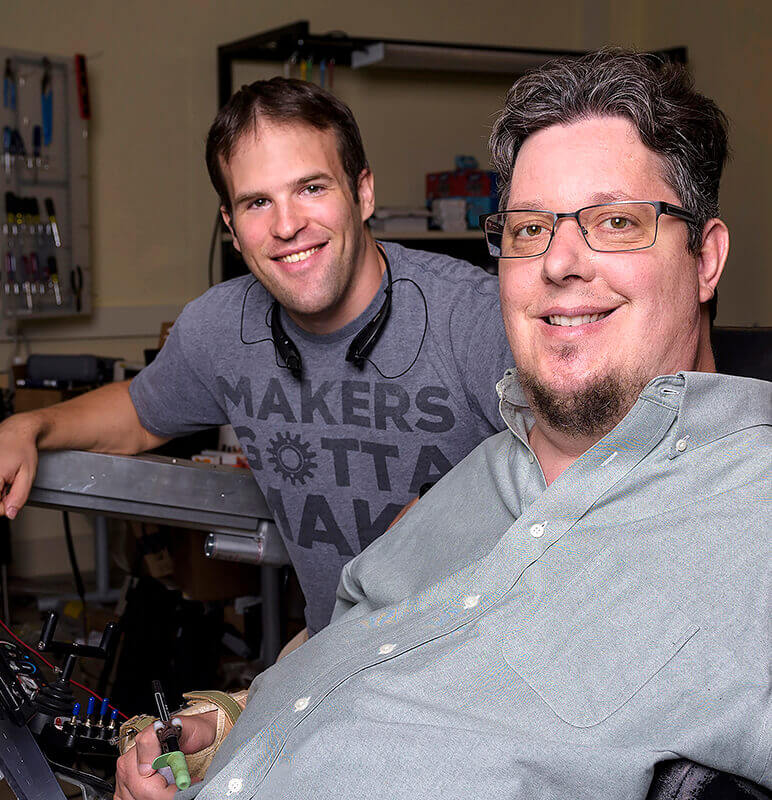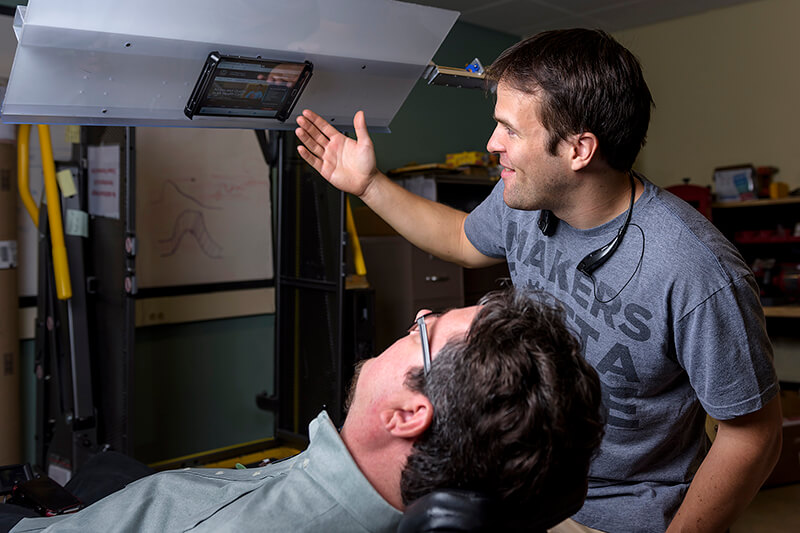August 24, 2017
Purdue startup receives Veteran Affairs’ grant, advance RoboTable, increase independence, improve quality of life
 RoboTable developers Brad Duerstock and Jeffrey Ackerman pose with RoboTable, an over-the-bed robotic arm that mobilizes laptops and mobile devices for veterans with mobility impairments or disabilities. The device’s design allows users to maintain productivity regardless of their position. (Purdue Research Foundation Image)
Download image
RoboTable developers Brad Duerstock and Jeffrey Ackerman pose with RoboTable, an over-the-bed robotic arm that mobilizes laptops and mobile devices for veterans with mobility impairments or disabilities. The device’s design allows users to maintain productivity regardless of their position. (Purdue Research Foundation Image)
Download image
WEST LAFAYETTE, Ind. – Prehensile Technologies, a company developing robotic assistive technology devices, is developing RoboTable, a robotic over-the-bed table, to help veterans and others with disabilities or mobility impairments better use their laptop computers and mobile devices while restricted to bed, allowing them to be more independent and remain productive with work or school.
The company is one of only three recipients of the U.S. Department of Veterans Affairs’ Specially Adapted Housing (SAH) Assistive Technology Grant offering funds designated to improve veterans’ or service members’ ability to live independently in an adapted home.
Brad Duerstock, Purdue University associate professor of engineering practice and co-founder of Prehensile Technologies, developed the technology.
“Unfortunately, a reality of living with chronic mobility impairments is that an individual may have to spend extended periods in bed while their wheelchair is repaired or while recovering from a medical problem,” he said. “These individuals are dependent on technology to work or mobilize.”
Jeffrey Ackerman, a graduate from the School of Mechanical Engineering and chief technology officer of Prehensile Technologies, co-developed RoboTable with Duerstock.
Ackerman said there is a high demand for this type of technology, especially among the veteran population.
“There are about 3.9 million veterans with at least one service-related disability in the U.S. Additionally, 6.4 million veterans have muscular-skeletal disabilities and 1.8 million have neurological disabilities,” he said. “These disabilities can limit their independence, thus we want to help provide a device that does not require hand or arm dexterity to operate.”
 Brad Duerstock and Jeffrey Ackerman developed RoboTable with funds from the U.S. Department of Veteran Affairs’ Specially Adapted Housing (SAH) Assistive Technology Grant. This robotic arm acts as an over-the-bed platform capable of mobilizing users’ mobile devices or laptop computer while they are restricted to bed. Duerstock (left) and Ackerman (right) demonstrate RoboTable’s ability to adjust for a reclined user’s needs. (Purdue Research Foundation Image)
Download image
Brad Duerstock and Jeffrey Ackerman developed RoboTable with funds from the U.S. Department of Veteran Affairs’ Specially Adapted Housing (SAH) Assistive Technology Grant. This robotic arm acts as an over-the-bed platform capable of mobilizing users’ mobile devices or laptop computer while they are restricted to bed. Duerstock (left) and Ackerman (right) demonstrate RoboTable’s ability to adjust for a reclined user’s needs. (Purdue Research Foundation Image)
Download image
RoboTable is mobilized by the user’s remote control so that regardless of the user’s position, the robotic arm can be moved and adjusted vertically and horizontally to best fit the user’s needs. When not in use, the RoboTable docks out of the way
“The retraction ability is key,” Duerstock said. “Our device cannot be in the way of patients nor inhibit caretakers’ duties. Conventional devices usually have fixed mounted positions on the bed or on the wheelchair. Our users can retract the arm and use their chair or bed however they want to. Users can even use RoboTable to view their smartphones or tablets from a completely reclined position.”
RoboTable stems from Prehensile Technologies’ first device, RoboDesk, a wheelchair platform allowing users to independently extend and retract the robotic arm and the devices it carries when needed. RoboTable seeks to offer the same independence and productivity for bed-bound users.
In the future, Prehensile Technologies plans to better address the needs of individuals with upper limb mobility impairments, potentially with voice control.
“We are focusing on effectively mobilizing tablets, smartphones, or laptops, and smaller or lighter mobile devices, at will,” Duerstock said. “With upper limb mobility impairments, individuals recognize a big difference between independently retrieving and removing their own mobile devices and relying on a caretaker to retrieve the devices. Individuals can become frustrated to call on caretakers to operate their own mobile devices so we want to encourage independence and confidence in the user’s ability.”
Prehensile Technologies receives startup assistance from the Purdue Foundry, an entrepreneurial accelerator in Discovery Park’s Burton D. Morgan Center for Entrepreneurship.
Ackerman believes that in the future, RoboTable could expand beyond its veteran audience to include long-term care facilities or chemotherapy settings.
“There is a need for users with disabilities and mobility impairments, but even able-bodied users could be more productive in bed with our device,” Ackerman said. “When people are lying down, it’s difficult to access mobile devices and keep them charged. Anyone, including able-bodied people, would like to read or watch videos while completely reclined. It’s an attractive feature for RoboTable to target both audiences.”
The SAH Assistive Technology Grant is valid for 18 months. At the end, Duerstock and Ackerman hope to have a manufacturer and a working prototype.
“We want veterans to feel more productive, more entertained and happier while in bed for long periods,” Ackerman said. “The more independence we can give to a person with a mobility impairment, the more their quality of life can improve.”
About Purdue Foundry
The Purdue Foundry is an entrepreneurship and commercialization accelerator in Discovery Park's Burton D. Morgan Center for Entrepreneurship whose professionals help Purdue innovators create startups. Managed by the Purdue Research Foundation, the Purdue Foundry was named a top recipient at the 2016 Innovation and Economic Prosperity Universities Designation and Awards Program by the Association of Public and Land-grant Universities for its work in entrepreneurship. For more information about funding and investment opportunities in startups based on a Purdue innovation, contact the Purdue Foundry at foundry@prf.org.
About Purdue Office of Technology Commercialization
The Purdue Office of Technology Commercialization operates one of the most comprehensive technology transfer programs among leading research universities in the U.S. Services provided by this office support the economic development initiatives of Purdue University and benefit the university's academic activities. The office is managed by the Purdue Research Foundation, which received the 2016 Innovation and Economic Prosperity Universities Award for Innovation from the Association of Public and Land-grant Universities. For more information about funding and investment opportunities in startups based on a Purdue innovation, contact the Purdue Foundry at foundry@prf.org. For more information on licensing a Purdue innovation, contact the Office of Technology Commercialization at innovation@prf.org.
Writer: Kelsey Henry, 765-588-3342, kehenry@prf.org
Purdue Research Foundation Contact: Hillary Henry, 765-588-3586, hkhenry@prf.org
Sources: Brad Duerstock, bsd@purdue.edu
Jeffrey Ackerman, jeffrey.k.ackerman@gmail.com
